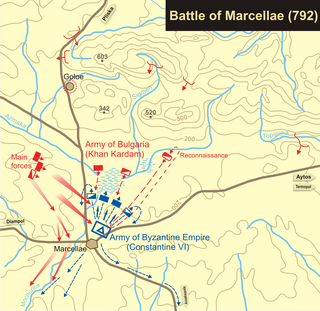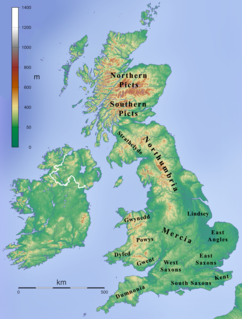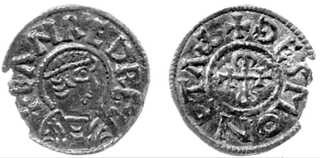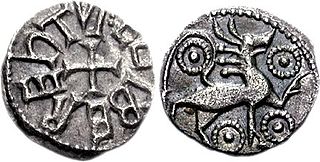Related Research Articles
The 790s decade ran from January 1, 790, to December 31, 799.

Year 790 (DCCXC) was a common year starting on Friday of the Julian calendar. The denomination 790 for this year has been used since the early medieval period, when the Anno Domini calendar era became the prevalent method in Europe for naming years.

Year 792 (DCCXCII) was a leap year starting on Sunday of the Julian calendar. The denomination 792 for this year has been used since the early medieval period, when the Anno Domini calendar era became the prevalent method in Europe for naming years.

Edmund Ironside was King of the English from 23 April to 30 November 1016. He was the son of King Æthelred the Unready and his first wife, Ælfgifu of York. Edmund's reign was marred by a war he had inherited from his father; his cognomen "Ironside" was given to him "because of his valour" in resisting the Danish invasion led by Cnut the Great.

Æthelred was king of Mercia from 675 until 704. He was the son of Penda of Mercia and came to the throne in 675, when his brother, Wulfhere of Mercia, died from an illness. Within a year of his accession he invaded Kent, where his armies destroyed the city of Rochester. In 679 he defeated his brother-in-law, Ecgfrith of Northumbria, at the Battle of the Trent: the battle was a major setback for the Northumbrians, and effectively ended their military involvement in English affairs south of the Humber. It also permanently returned the kingdom of Lindsey to Mercia's possession. However, Æthelred was unable to re-establish his predecessors' domination of southern Britain.

Wulfhere or Wulfar was King of Mercia from 658 until 675 AD. He was the first Christian king of all of Mercia, though it is not known when or how he converted from Anglo-Saxon paganism. His accession marked the end of Oswiu of Northumbria's overlordship of southern England, and Wulfhere extended his influence over much of that region. His campaigns against the West Saxons led to Mercian control of much of the Thames valley. He conquered the Isle of Wight and the Meon valley and gave them to King Æthelwealh of the South Saxons. He also had influence in Surrey, Essex, and Kent. He married Eormenhild, the daughter of King Eorcenberht of Kent.

Ceolred was King of Mercia from 709 to 716.

Aldfrith was king of Northumbria from 685 until his death. He is described by early writers such as Bede, Alcuin and Stephen of Ripon as a man of great learning. Some of his works and some letters written to him survive. His reign was relatively peaceful, marred only by disputes with Bishop Wilfrid, a major figure in the early Northumbrian church.
Osthryth, queen of the Mercians, was the wife of King Æthelred and daughter of King Oswiu of Northumbria and his second wife Eanflæd. She probably married Æthelred before 679 and was murdered by the nobles of Mercia.
Æthelbert was an eighth-century scholar, teacher, and Archbishop of York. Related to his predecessor at York, he became a monk at an early age and was in charge of the cathedral's library and school before becoming archbishop. He taught a number of missionaries and scholars, including Alcuin, at the school. While archbishop Æthelbert rebuilt the cathedral and sent missionaries to the Continent. Æthelbert retired before his death, and during his retirement built another church in York.

Eanred was king of Northumbria in the early ninth century.

Anglo-Saxon England or Early Medieval England, existing from the 5th to the 11th centuries from the end of Roman Britain until the Norman conquest in 1066, consisted of various Anglo-Saxon kingdoms until 927, when it was united as the Kingdom of England by King Æthelstan. It became part of the short-lived North Sea Empire of Cnut the Great, a personal union between England, Denmark and Norway in the 11th century.

Eadberht was king of Northumbria from 737 or 738 to 758. He was the brother of Ecgbert, Archbishop of York. His reign is seen as a return to the imperial ambitions of seventh-century Northumbria and may represent a period of economic prosperity. He faced internal opposition from rival dynasties and at least two actual or potential rivals were killed during his reign. In 758 he abdicated in favour of his son Oswulf and became a monk at York.

Alhred or Alchred was king of Northumbria from 765 to 774. He had married Osgifu, either the daughter of Oswulf, granddaughter of Eadberht Eating, or Eadberht's daughter, and was thus related by marriage to Ecgbert, Archbishop of York. A genealogy survives which makes Alhred a descendant of Ida of Bernicia through a son named Eadric.
Eadwulf was king of Northumbria from the death of Aldfrith in December 704 until February or March of 705, when Aldfrith's son Osred was restored to the throne.

Æthelwald Moll was King of Northumbria, the historic petty kingdom of Angles in medieval England, from 759 to 765. He seized power after the murder of Oswulf son of Eadberht; his ancestry and connection to the royal family of Northumbria is unknown. Æthelwald faced at least one rebellion, led by Oswine, perhaps a brother of Oswulf. In 765 a Witenagemot of Northumbrian notables deposed Æthelwald and replaced him with Alhred, a kinsman of his predecessor. After his removal from the throne Æthelwald became a monk, perhaps involuntarily.

Æthelred, was the king of Northumbria from 774 to 779 and again from 790 until he was murdered in 796. He was the son of Æthelwald Moll and Æthelthryth and possibly became king while still a child after Alhred was deposed.

Ælfwald was king of Northumbria from 779 to 788. He is thought to have been a son of Oswulf, and thus a grandson of Eadberht Eating.
Eardwulf was king of Northumbria from 796 to 806, when he was deposed and went into exile. He may have had a second reign from 808 until perhaps 811 or 830. Northumbria in the last years of the eighth century was the scene of dynastic strife between several noble families: in 790, king Æthelred I attempted to have Eardwulf assassinated. Eardwulf's survival may have been viewed as a sign of divine favour. A group of nobles conspired to assassinate Æthelred in April 796 and he was succeeded by Osbald: Osbald's reign lasted only twenty-seven days before he was deposed and Eardwulf became king on 14 May 796.
Events from the 8th century in England.